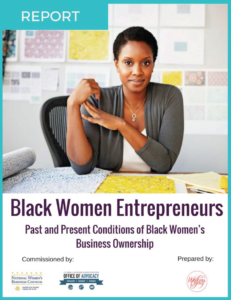Black Women Entrepreneurs: Past and Present Conditions of Black Women Business Ownership
Walker’s Legacy for the National Women’s Business Council and the U.S. SBA Office of Advocacy
First published October 2016
The number of women-owned businesses is rapidly growing. Amidst these increases, Black women have become one of the fastest growing segments of entrepreneurs in the country. This work explores the many challenges and opportunities faced by Black women entrepreneurs.
Historically, Black Americans have owned and operated their own businesses in the United States since the era of slavery. Black women have long made up a significant portion of the labor force and have done so alongside Black American men. As of 2012, Black women entrepreneurs owned approximately 1,525,494 businesses across the United States and composed almost 58.9 percent of all Black business owners.
Motivations for women to start their own businesses include escape from labor and market disadvantages and discrimination, desire for career advancement beyond perceived glass ceilings, family commitments, personal interests, and the pursuit of financial stability. Black women have been shown to exhibit similar motivations as women business owners overall, but also explicitly express the desire to support and uplift their communities in the process.
Existing studies suggest numerous barriers that women face as they seek to start and maintain a successful business, including lack of start-up capital, resources, and loans; gender discrimination within male-dominated sectors; little access to strong networks; difficulty in obtaining government contracts; and children and family obligations. Similar barriers exist for Black women and are further compounded by the influence of race on social, human, and financial capital. In order to inform its analysis of Black women’s entrepreneurship, Walker’s Legacy hosted three events in Washington, DC; Houston, TX; and New York, NY. Each event was designed to illuminate the experiences of Black women entrepreneurs in the community. In addition to the Black women entrepreneurs, each event also included Black financial service representatives, government and policy officials, general and business community leaders, academics, and business service providers.
Download Resource